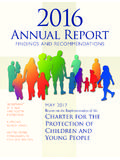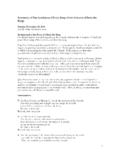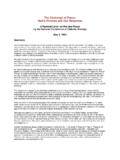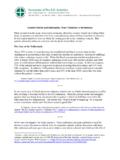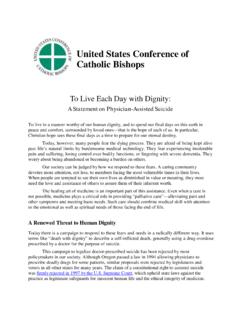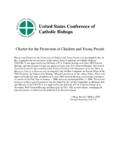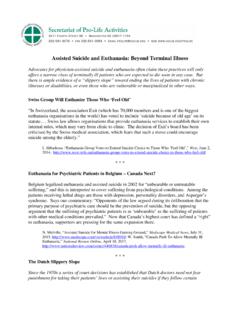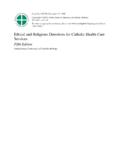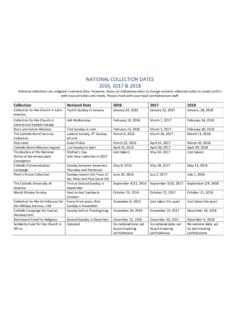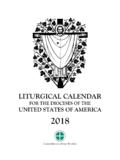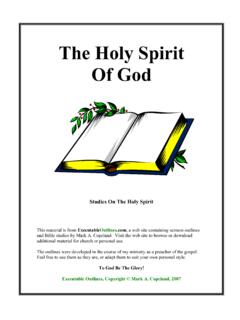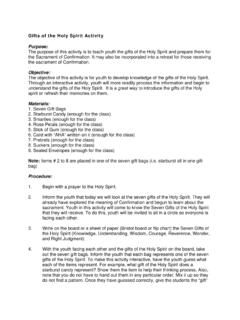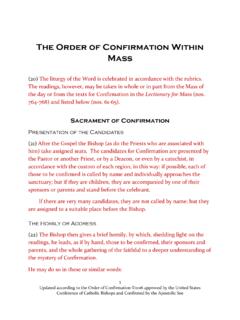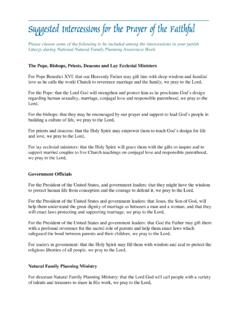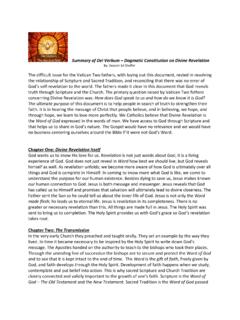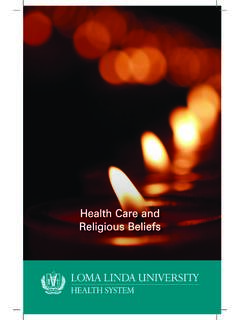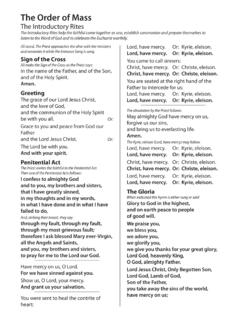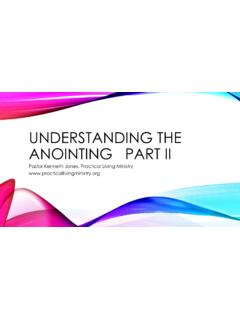Transcription of PREPARATORY DOCUMENT
1 PREPARATORY DOCUMENTSYNOD OF BISHOPSCONTENTSI. The Call to Journey TogetherII. A Constitutively Synodal ChurchIII. Listening to the Scriptures Jesus, the Crowd, the Apostles A Double Dynamic of Conversion: Peter and Cornelius (Acts 10)IV. Synodality in Action: Pathways for Consulting the People of God The Fundamental Question Different Articulations of Synodality Ten Thematic Nuclei to be Explored To Contribute to the ConsultationAbbreviationsITC INTERNATIONAL THEOLOGICAL COMMISSIONDV VATICAN COUNCIL II, Dogm. Const. Dei Verbum (18 November 1965)EC FRANCIS, Ap. Const. Episcopalis communio (15 September 2018)EG FRANCIS, Ap. Exhort. Evangelii gaudium (24 November 2013)FT FRANCIS, Enc. Lett. Fratelli tutti (3 October 2020)GS VATICAN COUNCIL II, Past. Const. Gaudium et spes (7 December 1965)LG VATICAN COUNCIL II, Dogm. Const. Lumen gentium (21 November 1964)LS FRANCIS, Enc. Lett. Laudato si (24 May 2015)UR VATICAN COUNCIL II, Decree Unitatis redintegratio (21 November 1964)For a Synodal Church: Communion, Participation, and Mission1.
2 The Church of God is convoked in Synod. The path entitled For a Synodal Church: Communion, Participation, and Mission will solemnly open on the 9th 10th of October 2021 in Rome and on the following 17th of October in each particular Church. One fundamental stage will be the celebration of the XVI Ordinary General Assembly of the Synod of Bishops, in October 2023,1 which will be followed by the implementation phase that will again involve the particular Churches (cf. EC, arts. 19-21). 1 The stages of the synodal journey are reported this convocation, Pope Francis invites the entire Church to reflect on a theme that is decisive for its life and mission: It is precisely this path of synodality which God expects of the Church of the third millennium. 2 This journey, which follows in the wake of the Church s renewal proposed by the Second Vatican Council, is both a gift and a task: by journeying together and reflecting together on the journey that has been made, the Church will be able to learn through Her experience which processes can help Her to live communion, to achieve participation, to open Herself to mission.
3 Our journeying together is, in fact, what most effectively enacts and manifests the nature of the Church as the pilgrim and missionary People of FRANCIS, Address for the ceremony commemorating the 50th anniversary of the institution of the Synod of Bishops (17 October 2015).2. A basic question prompts and guides us: How does this journeying together, which takes place today on different levels (from the local level to the universal one), allow the Church to proclaim the Gospel in accordance with the mission entrusted to Her; and what steps does the spirit invite us to take in order to grow as a synodal Church?Addressing this question together requires listening to the Holy spirit , who like the wind blows where it wills; you can hear the sound it makes, but you do not know where it comes from or where it goes (Jn 3:8), remaining open to the surprises that the spirit will certainly.
4 This path of synodality which God expects of the Church of the third millennium ..2prepare for us along the way. Thus, a dynamism is activated that allows us to begin to reap some of the fruits of a synodal conversion, which will progressively mature. These are objectives of great importance for the quality of ecclesial life and for accomplishing the mission of evangelization, in which we all participate by virtue of our Baptism and Confirmation. Here, we will indicate the main objectives, which decline synodality as the form, the style, and the structure of the Church: recalling how the spirit has guided the Church s journey through history and, today, calls us to be, together, witnesses of God s love; living a participative and inclusive ecclesial process that offers everyone especially those who for various reasons find themselves on the margins the opportunity to express themselves and to be heard in order to contribute to the edification of the People of God; recognizing and appreciating the wealth and the variety of the gifts and charisms that the spirit liberally bestows for the good of the community and the benefit of the entire human family.
5 3 exploring participatory ways of exercising responsibility in the proclamation of the Gospel and in the effort to build a more beautiful and habitable world; examining how responsibility and power are lived in the Church as well as the structures by which they are managed, bringing to light and trying to convert prejudices and distorted practices that are not rooted in the Gospel; accrediting the Christian community as a credible subject and reliable partner in paths of social dialogue, healing, reconciliation, inclusion and participation, the reconstruction of democracy, the promotion of fraternity and social friendship; regenerating relationships among members of Christian communities as well as between communities and other social groups, , communities of believers of other denominations and religions, civil society organizations, popular movements, etc.
6 ; fostering the appreciation and appropriation of the fruits of recent synodal experiences on the universal, regional, national, and local This PREPARATORY DOCUMENT is at the service of the synodal journey, especially as a tool to facilitate the first phase of listening to and consulting the People of God in the particular Churches (October 2021 - April 2022), in the hope of helping to set in motion the ideas, energy, and creativity of all those who will take part in the journey, and to make it easier to share the fruits of their efforts. With this aim: 1) it begins by outlining some prominent characteristics of the contemporary context; 2) it synthetically illustrates the fundamental theological references for a correct understanding and practice of synodality; 3) it offers some biblical thoughts that can nourish meditation and prayerful reflection along the way; 4) it illustrates some perspectives from which to reread the experiences of lived synodality; 5) it shows some ways of articulating this work of rereading in prayer and sharing.
7 To concretely accompany the organization of the work, a methodological Handbook, annexed to this PREPARATORY DOCUMENT and available on the dedicated hosting website, is proposed3. The site offers some resources for deepening the theme of synodality, as a support to this PREPARATORY DOCUMENT ; among these, we would like to highlight two that are mentioned several times below: the Address at the Ceremony Commemorating the 50th Anniversary of the Institution of the Synod of Bishops, given by Pope Francis on the 17th of October 2015, and the DOCUMENT Synodality in the Life and Mission of the Church, prepared by the International Theological Commission and published in Cf. 5I. The Call to Journey Together4. The synodal journey unfolds within a historical context marked by epochal changes in society and by a crucial transition in the life of the Church, which cannot be ignored: it is within the folds of the complexity of this context, in its tensions and contradictions, that we are called to scrutinize the signs of the times and interpret them in the light of the Gospel (GS, no.)
8 4). Some elements of the global scenario most closely connected to the theme of the Synod are outlined here; but the picture will need to be enriched and completed at the local A global tragedy such as the COVID-19 pandemic momentarily revived the sense that we are a global community, all in the same boat, where one person s problems are the problems of all. Once more we realized that no one is saved alone; we can only be saved together (FT, no. 32). At the same time, the pandemic has also made the already existing inequalities and inequities explode: humanity seems increasingly shaken by processes of massification and fragmentation; the tragic condition faced by migrants in all regions of the world shows how high and strong the barriers dividing the single human family still are. The Encyclicals Laudato si and Fratelli Tutti DOCUMENT the 7depth of the fault lines that run through humanity, and we can refer to these analyses to start listening to the cry of the poor and of the earth and to recognize the seeds of hope and of the future that the spirit continues to sow even in our time: The Creator does not abandon us; he never forsakes his loving plan or repents of having created us.
9 Humanity still has the ability to work together in building our common home (LS, no. 13).6. This situation, which, despite great differences, unites the entire human family, challenges the Church s ability to accompany individuals and communities to reread experiences of mourning and suffering that have unmasked many false certainties, and to cultivate hope and faith in the goodness of the Creator and his creation. However, we cannot hide from the fact that the Church herself must face the lack of faith and the corruption even within herself. In particular, we cannot forget the suffering experienced by minors and vulnerable people due to sexual abuse, the abuse of power and the abuse of conscience perpetrated by a significant number of clerics and consecrated persons. 4 We are continually challenged as the People of God to take on the pain of our brothers and sisters wounded in their flesh and in their spirit .
10 5 For too long the cry of the victims has been a cry that the Church has not 4 FRANCIS, Letter to the People of God (20 August 2018), Ibid., no. able to hear sufficiently. These are deep wounds that are difficult to heal, for which forgiveness can never be asked for enough and which constitute obstacles, sometimes imposing ones, to advancing in the direction of journeying together. The whole Church is called to deal with the weight of a culture imbued with clericalism that she inherits from her history, and with those forms of exercising authority on which the different types of abuse (power, economic, conscience, sexual) are grafted. It is impossible to think of a conversion of our activity as a Church that does not include the active participation of all the members of God s People: 6 together let us ask the Lord for the grace of conversion and the interior anointing needed to express before these crimes of abuse our compunction and our resolve courageously to combat them.
